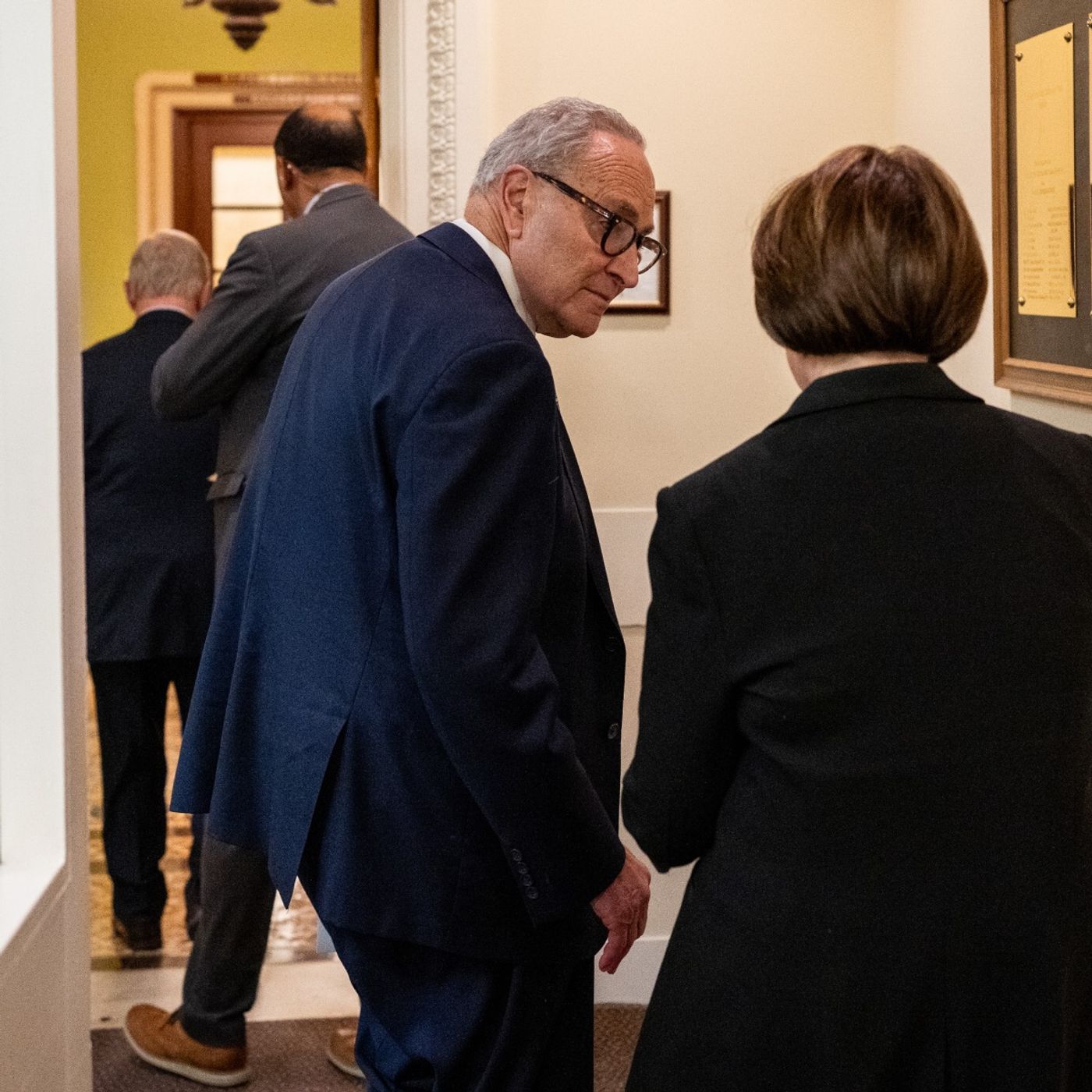The Fight at the Center of the Government Shutdown
The New York Times journalists Margot Sanger-Katz and Shane Goldmacher explain why the Democrats are betting on this strategy and who is to blame for the impasse.
Press play and read along
Transcript
Speaker 1 This podcast is supported by the International Rescue Committee.
Speaker 1 When conflict and disaster strike, the IRC is ready to help families immediately after an emergency occurs and long term with health care supplies, clean water, and other critical aid.
Speaker 1 As crises continue in Gaza, Ukraine, Sudan, and around the world, the IRC is committed to ensuring families can survive, recover, and rebuild their lives.
Speaker 1 For a limited time, all donations are doubled to help the IRC meet this moment of unprecedented need. Make your matched gift at rescue.org/slash rebuild.
Speaker 2 Hey everyone, it's Rachel. I'm here with a quick announcement.
Speaker 2 Part of what we do at the show, as you know, is take you, our listeners, into the world of an important story and behind the journalism in the newsroom here at the New York Times.
Speaker 2 But we were thinking that there are certain stories that are hard to do in a busy news week and so many brilliant people doing incredible things at the Times that might not end up on our regular program.
Speaker 2 So we decided we wanted to try something new and fun. We're going to bring you some other kinds of conversations and stories.
Speaker 2 To begin with, we'll sit down for a conversation with our colleagues over in games. And we're also going to show you how our composers work in the audio department.
Speaker 2 We have other ideas of fun things, but these are the first two.
Speaker 2 And our plan is to make these bonus conversations available only for subscribers. It's a way of saying thank you for supporting the work that we do here at the show and at the Times.
Speaker 2 And just to say, other shows are going to do this too. Ezra Klein is going to do a book episode.
Speaker 2 You'll get special early access to the next season of Serial, and there will be lots of other things for all of you who go to the extra step of subscribing to the New York Times.
Speaker 2 Just to be clear, you don't have to subscribe to listen to the regular show, and the most recent episodes of the daily will remain free for everyone.
Speaker 2 So, thank you for being a daily listener, and if you want to learn more about subscribing, you can go to nytimes.com slash podcasts or subscribe directly on Apple Podcasts or Spotify.
Speaker 2 Okay, announcement over, here's today's show.
Speaker 2 From the New York Times, I'm Rachel Abrams, and this is the daily.
Speaker 2 As the government shutdown enters its second day, Democrats are determined to make this growing political fight all about the rising costs of health care.
Speaker 2 Today, I speak to my colleagues Margo Sanger-Katz and Shane Goldmacher about why the Democrats are betting on this particular strategy and who is really to blame.
Speaker 2 It's Thursday, October 2nd.
Speaker 2 Margo, we are talking to you on the first full day of the government shutdown.
Speaker 2 And Senate Democrats, in explaining why the government is shut down, have said that this is above all about surging health care costs.
Speaker 2
And Democrats are basically saying that in some cases, Premiums for Americans, some Americans, are going to be doubling. And I want to start there.
Is that accurate? accurate?
Speaker 3 On average, that is accurate.
Speaker 3 So this applies to people who buy their own insurance.
Speaker 3 So people, if you don't get insurance through work and you're not in a government program like Medicaid or Medicare, you might go to the Obamacare marketplace and buy your own insurance.
Speaker 3 And the government has set up subsidies that help make that insurance affordable for people. And some of these subsidies are set to expire at the end of the year.
Speaker 3 And when that happens, it means the amount that people are going to have to pay for their health insurance is going to go up by a lot.
Speaker 3 On average, KFF health research group has estimated it's like 114% increase, but there's actually a lot of variation under the hood.
Speaker 3 For some really low-income people who have been paying zero for their health insurance, they're going to have to pay somewhere between like $35 and $60 a month.
Speaker 3 But then, as you go like up the income scale, if you imagine someone who's making like around $65,000 a year, that's someone who might have to pay like $20,000 more a year in some markets. Wow.
Speaker 3 So you see these really big effects. They're uneven and they do depend on how much you make, where you live and how old you are because nothing about Obamacare is simple.
Speaker 3 But a lot of people and particularly people in red states that did not expand Medicaid are going to be looking at some very large sticker shock if these subsidies expire.
Speaker 2 To hear the Democrats tell it. The reason that they're shutting down the government is because they say Republicans are to blame for these rising health care costs.
Speaker 2 And the Democrats will not agree to fund the government until Republicans back a spending bill that lowers those health care costs. That's the overall message, right?
Speaker 2 So, I guess I'm wondering, how do we actually get to this position that we're in in the first place?
Speaker 3 Well, I think, as is the case with many political questions, the answer to that is a little bit tricky. I think you have to go back to the politics of the Democratic majorities in the Biden era.
Speaker 3 So, as you may remember, the Democrats had both the White House, the Senate, and the House.
Speaker 3 So during the pandemic, when Democrats felt like they could spend a lot of money to help prop up the economy, they extended the subsidies into this current system
Speaker 3 where the help is just much more generous. And there was a debate inside the Democratic Party about how long the subsidies should get extended.
Speaker 3 A lot of Democrats, including the White House and the Democratic leadership, really wanted to make this a permanent program. They felt like this was an improvement on the original Obamacare program.
Speaker 3 It was making insurance more affordable. It was bringing in lots of people who were previously uninsured.
Speaker 3 But they had kind of a small majority, and they had some members in their caucus in the Senate who were pretty conservative.
Speaker 3 And one of them was Joe Manchin of West Virginia, sort of the most conservative member of the Democratic caucus. He was concerned that the Democrats shouldn't spend too much money.
Speaker 3 And it turns out that subsidizing the health insurance of millions of Americans is actually pretty expensive. And they absolutely needed his vote to extend these subsidies.
Speaker 2 Because Republicans were never going to vote for these extensions.
Speaker 3 Yeah. And so the compromise that the Democratic leadership reached with Senator Manchin was they would extend these subsidies, but only for a few years, not forever.
Speaker 2 So there was an expiration date on them originally.
Speaker 3 And there was also, I think, a calculation. They specifically chose to have them expire now because they knew that Congress was going to have to revisit another set of expiring laws.
Speaker 3 The Trump tax cuts also were set to expire at the end of this year.
Speaker 3 And the Democrats were basically taking a gamble that probably they would have enough control in Washington that they would be able to make some kind of deal with Republicans, where, in exchange for extending the Trump tax cuts, which Republicans all wanted, the Democrats would be able to get them to also extend these Obamacare subsidies.
Speaker 3 Of course, what happened is that Republicans swept to power and had full control of the government.
Speaker 3 So they passed their major tax and domestic policy bill without needing any help from Democrats at all.
Speaker 3 Not only were Democrats unsuccessful in getting Republicans to include these subsidies in their bill, but they also were unsuccessful in fighting off almost a trillion dollars in other cuts to health care, mostly in the Medicaid program.
Speaker 2 So clearly the bet that the Democrats made when all of this went into effect did not pan out.
Speaker 3 I think that's true, but it's also the kind of bet that Congress makes all the time.
Speaker 3 It is not just Democrats who pass bills with these expiring provisions, hoping that a future Congress is going to make their temporary program permanent.
Speaker 3 And I think if you look at what's happened since these subsidies were expanded in the last few years, enrollment in Obamacare has more than doubled, and most of the increase has been in Republican states.
Speaker 3 Georgia, Florida, and Texas have had absolutely enormous increases in the number of people who are enrolled in this program.
Speaker 3 And those are people who are really at risk of losing their insurance if they suddenly have to pay a lot more.
Speaker 3 And the states that are going to see the biggest increase in prices for kind of middle-income people who earn a little bit more than $60,000 are also going to be in Republican states like Wyoming, Alaska, and West Virginia.
Speaker 3 So I think Democrats feel like they have some leverage over Republicans.
Speaker 2 Meaning that there might be some Republicans who are willing to extend the cuts now because of the benefits to their constituents, even if they didn't vote to extend the same subsidies the first time around.
Speaker 3 Yeah. Democrats think that maybe Republicans would actually be willing to support this program because so many of their constituents benefit from it.
Speaker 2 But this is actually a pretty big gamble because the reality right now is that the government is shut down and Americans don't know when the shutdown is going to end.
Speaker 2 And Republicans who control all three branches of government, they are out there saying, this is the fault of the Democrats.
Speaker 3 Anytime you're shutting down the government, you're taking a pretty big risk. And the reality is that Democrats do not have a lot of political control.
Speaker 2 But
Speaker 3 I think that they feel like healthcare is a really good issue for them. It's one that they have run and won on in the past.
Speaker 3 It's one that they feel voters trust them on more than Republicans, which is not true for a lot of other issues.
Speaker 3 And so I think they feel like if they're going to have a fight, a big, prominent, messy fight that's going to get a lot of attention, they want to have it on this ground.
Speaker 2 After the break, Shane Goldmacher on the last time Democrats used healthcare to win the political moment against President Trump.
Speaker 2 We'll be right back.
Speaker 4 This podcast is supported by Bank of America Private Bank.
Speaker 5 Your Your ambition leaves an impression. What you do next can leave a legacy.
Speaker 6 At Bank of America Private Bank, our wealth and business strategies can help take your ambition to the next level.
Speaker 9 Whatever your passion, unlock more powerful possibilities at privatebank.bankofamerica.com. What would you like the power to do?
Speaker 6 Bank of America, official bank of the FIFA World Cup 2026.
Speaker 11 Bank of America Private Bank is a division of Bank of America NA member FDIC and a wholly owned subsidiary of Bank of America Corporation.
Speaker 12
A biotech firm scaled AI responsibly. A retailer reclaimed hours lost to manual work.
An automaker now spots safety issues faster.
Speaker 12 While these organizations are vastly different, what they have in common sets them apart. They all worked with Deloitte to help them integrate AI and drive impact for their businesses.
Speaker 12
Because Deloitte focuses on building what works, not just implementing what's new. The right teams, the right services and solutions.
That is how Deloitte's clients stand out.
Speaker 12
Deloitte together makes progress. At Memorial Sloan Kettering Cancer Center, we know that a cancer diagnosis touches more than one life.
It touches entire families.
Speaker 12
Make a gift to MSK in honor or in memory of someone you love. Your donation fuels groundbreaking research and compassionate care for patients and their families all over the world.
Honor their legacy.
Speaker 12
Give hope to others. Your impact can can be doubled for a limited time.
Donate now at msk.org slash honor dash 2x.
Speaker 2 Shane, thanks for joining us.
Speaker 13 Thanks for having me on.
Speaker 2 So what's happening now, this fight around healthcare, echoes another fight from the not-too-distant past, and that's what we want to talk to you about.
Speaker 2 So just to start, can you tell us the last time Democrats used the issue of healthcare to try to gain the upper hand against President Trump?
Speaker 13 Yeah, I mean, it was the first year of his first term.
Speaker 13 You think back to 2017, and the Democratic Party was feeling a bit overwhelmed, as Trump did so many different things at once and was involved in what they felt were so many scandals, and the Mueller investigation, and the FBI directors getting fired, and all these things.
Speaker 13 And ultimately, Those were not the issues that the Democratic Party ran on in the 2018 midterms, the first midterm election election of Trump's first term.
Speaker 13 What they ended up running on almost overwhelmingly.
Speaker 2 This is the issue that is on the ballot. This election is about health care.
Speaker 13 Was health care?
Speaker 2 How do we preserve the Affordable Care Act from the assault we know it will receive?
Speaker 13 And this was a strategy that Nancy Pelosi and House Democrats came upon as Trump and the Republicans tried to repeal the Obamacare measure.
Speaker 14 One thing we have to do, repeal and replace.
Speaker 13 They They had a big repeal and replace measure.
Speaker 14 Repeal and replace. Repeal and replace.
Speaker 15 Repealing and replacing the disaster known as Obamacare.
Speaker 13 It didn't become law, but that didn't matter. Democrats still used this issue and said, Republicans want to take away your health care.
Speaker 2 Now that Donald Trump is trying to sabotage Obamacare, I'm running for Congress to protect and improve it.
Speaker 13 And for all of the controversies of those first couple of Trump years, this is the one that actually broke through on television.
Speaker 16 A year ago today, my own representative, Congressman Tom MacArthur, introduced a legislation that tried to take away health care from millions of Americans.
Speaker 2 When I saw Congressman Bishop smiling at the White House after voting to gut protections for pre-existing conditions, something inside me broke.
Speaker 13 This is the one that Democratic candidates in every corner of the country ran ads on.
Speaker 13 Half the political ads, according to a study after the election in 2018 that democrats ran half of the ads talked about health care and just remind us how well did it work for democrats in 2018 i mean it worked pretty well in the house they won 40 seats and flipped the chamber and were able to be a check in the second half of that first term they impeached donald trump they took power and so Now you have Democrats again, a little overwhelmed by a sea of issues that the president is stirring up and settling now into this shutdown fight.
Speaker 13 What is the thing they want to stop Trump on? What is the thing they want to fight with Trump about? Is it about his overreach in one place? Is it about firings of U.S. attorneys?
Speaker 13 Is it about investigations? It's back to that same issue. It's healthcare.
Speaker 13 And unlike in 2017 and 2018, where the Republicans had tried to act on this issue and failed, the current Republican Congress and President Trump have actually made changes to healthcare care policy.
Speaker 13 And so the Democratic Party isn't just running on the theoretical threats of Republican changes to health care. They're running on the reality of changes that are set to go into effect.
Speaker 2
But just to point out one obvious difference. Right now, this is not technically an election year, unlike 2018.
But the next election, of course, is a midterm election next November.
Speaker 13 So with that in mind, how much does this Democratic strategy that we're talking about resemble the 2018 playbook well we don't know for sure right they have yet to run ads in a lot of these districts the campaign hasn't been fully formed yet but what you see in this shutdown is the Democrats basically trying to settle on an issue where they know they're on the winning side of public opinion and they're trying to basically lay the groundwork for voters to know one year from now where the two parties are on this.
Speaker 13 And look, Ted Cruz and the Republicans pushed a major shutdown that that was a really big deal in 2013. And guess what? Republicans won a bunch of seats in the Congress the next year, right?
Speaker 13 So the issue isn't just do you win this temporary argument around the shutdown? It can also be, do you win the long-term argument of what your party is seen fighting for?
Speaker 13 And that's very much what the Democratic Party is hoping for, that they can be seen fighting for health care, an issue that they've won before on and one they think that they can win again on.
Speaker 2 In other words, they're betting that healthcare is going to be a bigger deal than shutting down the government.
Speaker 13 Absolutely.
Speaker 2 So how are Republicans responding to that strategy?
Speaker 13 I think they're chiefly so far responding to the shutdown part of it, which is to say, first off, it's the Democrats who have shut down this government for this issue of health care.
Speaker 13 And second, to pivot to areas where the Republican Party is more trusted. And that so far has been immigration.
Speaker 13 They've been talking about how the Democrats want to fight for health care for illegal immigrants, although the Obamacare subsidies that are at issue here that the Democrats are demanding be extended do not apply to people who are here illegally.
Speaker 13 But that's the focus, right?
Speaker 13 And they're doing it to try to send a signal that this is actually not about health care, but about spending money for people who are here illegally, which polls unpopularly, right?
Speaker 13 The Democrats are staking ground on a place that is popular, and the Republicans are trying to to change the ground into a place that is unpopular.
Speaker 2 Basically, each side is retreating to issues that are winning for them in their own way.
Speaker 13 Their own safe spaces, so to speak.
Speaker 2 It strikes me that for the strategy to work that you are describing, Democrats need to focus on healthcare basically for as long as possible, right?
Speaker 2 Like, basically, is it actually to their benefit to have Republicans refuse to meet them halfway so they can keep kind of pounding on about these rising health care costs and blame it on the other side?
Speaker 13 Look, I think that if the Democratic Party could snap their fingers and have Republicans actually negotiate over health care and strike a deal on this, they would take that in a heartbeat.
Speaker 13 On a policy that they care about, that the Democratic base cares about, that impacts voters, they would absolutely take that.
Speaker 13 And look, some Republicans are even open to negotiations on this exact policy, on whether there should be some subsidies extended for Obamacare, because this does impact voters.
Speaker 13 But the Republicans are pretty universal on.
Speaker 17 We all understand that Democrats and Republicans have policy disagreements.
Speaker 13 And what you heard from J.D. Vance.
Speaker 17 You don't have policy disagreements that serve as the basis for a government shutdown.
Speaker 13 As long as the government is shut down,
Speaker 13 you're getting absolutely nothing.
Speaker 17 Do the right thing, open up the people's government, and then let's fix health care policy for the American people.
Speaker 13 Questions?
Speaker 2 Shane, do you have any sense about which side has the upper hand right now?
Speaker 13 I think it's really hard to say, right?
Speaker 13 Like the Democratic Party is fighting on an issue that they think they have the high ground that is popular in polling, which is healthcare and making healthcare cheaper for Americans.
Speaker 13 But there's a tricky thing here, which is in order to show that you're fighting for healthcare, you kind of have to own that you're shutting down the government to do it.
Speaker 13 And voters don't want to see the government shut down for political demands.
Speaker 13 And so each day that the government stays shut down and more and more more Americans are impacted by the government shutdown, that people start missing paychecks, that parks start closing, that services stop being offered, it becomes a bigger and bigger gamble for the Democratic Party.
Speaker 2 Shane, thank you so much.
Speaker 13 Thank you for having me.
Speaker 2 On Wednesday evening, the Trump administration halted billions of dollars in funds for Democratic-led states while it readied to lay off scores of government workers, a plan seemingly intended to maximize pain from the shutdown.
Speaker 2 In a series of social media posts, Russell T.
Speaker 2 Vogt, the White House budget director, said that the administration had paused or moved to cancel the delivery of about $26 billion in previously approved funds across a range of programs, describing the money as wasteful or in need of further review.
Speaker 2 We'll be right back.
Speaker 4 This podcast is supported by Bank of America Private Bank.
Speaker 5 Your ambition leaves an impression. What you do next can leave a legacy.
Speaker 6 At Bank of America Private Bank, our wealth and business strategies can help take your ambition to the next level.
Speaker 9 Whatever your passion, unlock more powerful possibilities at privatebank.bankofamerica.com. What would you like the power to do?
Speaker 6 Bank of America, official bank of the FIFA World Cup 2026.
Speaker 11 Bank of America Private Bank is a division of Bank of America and a member of FDIC and a wholly owned subsidiary of Bank of America Corporation.
Speaker 12 With Disney Plus and Hulu, there's so much amazing entertainment to discover every day.
Speaker 12 Whether you're looking to binge a classic hit like Modern Family, enjoy the biggest blockbuster like Marvel Studios Thunderbolts on Disney Plus, catch the latest news on what you need to know, or check out new episodes of Only Murders in the Building.
Speaker 12
This is the one place that has it all. Get all of this and so much more with Disney Plus and Hulu every day.
18 and up only. Offer valid for eligible subscribers only.
Terms apply.
Speaker 12 This podcast is supported by CARE, a global humanitarian organization that turns care into action in over 100 countries. Lewis watched his home in Mozambique vanish under floodwaters.
Speaker 12 Instead of giving up, he turned his boat into hope, rescuing dozens of people. Who cares?
Speaker 2 You do.
Speaker 12
And so does CARE. Every day, together with you, CARE saves lives and helps millions of people find the way to a better life worldwide.
When the floods rose, Lewis didn't wait. Neither can we.
Speaker 12 Stand with us at care.org/slash New York Times.
Speaker 2 Here's what else you need to know today.
Speaker 2 The Supreme Court on Wednesday blocked President Trump's efforts to remove Lisa Cook from the Board of the Federal Reserve, at least temporarily stymieing his efforts to reshape the agency as he pushes it to lower interest rates.
Speaker 2 The court said it would review the administration's efforts to oust Ms. Cook at oral arguments in January.
Speaker 2 Top former Fed and Treasury officials had warned the court that allowing the president president to fire Ms.
Speaker 2 Cook while litigation was underway would roil the markets and undermine public confidence in the Fed.
Speaker 2 And
Speaker 2 scientist and conservationist Jane Goodall, who made groundbreaking discoveries about how chimpanzees behave and communicate, has died at the age of 91.
Speaker 18 When I arrived in Gombe, I had no idea.
Speaker 18 what I was going to do except that I was going to try and get the chimpanzees used to me so that I could really learn about what they were doing.
Speaker 2 Goodall observed chimps by living alongside them on a reserve in what is now Tanzania beginning in 1960.
Speaker 18 I've seen a mother laugh when she hears her older child who hasn't paid attention and he hasn't noticed which way she's gone and that the older child is going through the forest whimpering, crying, you know.
Speaker 2 After months of working to gain their trust, she documented the chimps engaging in behaviors previously thought to be exclusive to people, including making and using tools.
Speaker 18 Bringing the chimpanzees into people's lives as individuals, as personalities, as creatures with whom we can relate so
Speaker 18 individually. And that in turn has led to a gradual blurring of the line that we used to see as so sharp between us on the one hand and all the other amazing animals on the other.
Speaker 18 Now that line is very blurry thanks to the chimp.
Speaker 2 Goodall eventually came to advocate for them and other wildlife by founding the Jane Goodall Institute, one of the world's largest conservation groups.
Speaker 2 Today's episode was produced by Olivia Nat, Nina Feldman, and Stella Tam with help from Alex Stern.
Speaker 2 It was edited by Mark George and Mike Benoit, contains music by Dan Powell, Marion Lozano, and Alicia Baitoup, and was engineered by Chris Wood.
Speaker 2
That's it for the daily. I'm Rachel Abrams.
See you tomorrow.
Speaker 4 This podcast is supported by Bank of America Private Bank.
Speaker 5 Your ambition leaves an impression. What you do next can leave a legacy.
Speaker 6 At Bank of America Private Bank, our wealth and business strategies can help take your ambition to the next level.
Speaker 9 Whatever your passion, unlock more powerful possibilities at privatebank.bankofamerica.com. What would you like the power to do?
Speaker 6 Bank of America, official bank of the FIFA World Cup 2026.
Speaker 11 Bank of America Private Bank is a division of Bank of America NA member FDIC and a wholly owned subsidiary of Bank of America Corporation.





